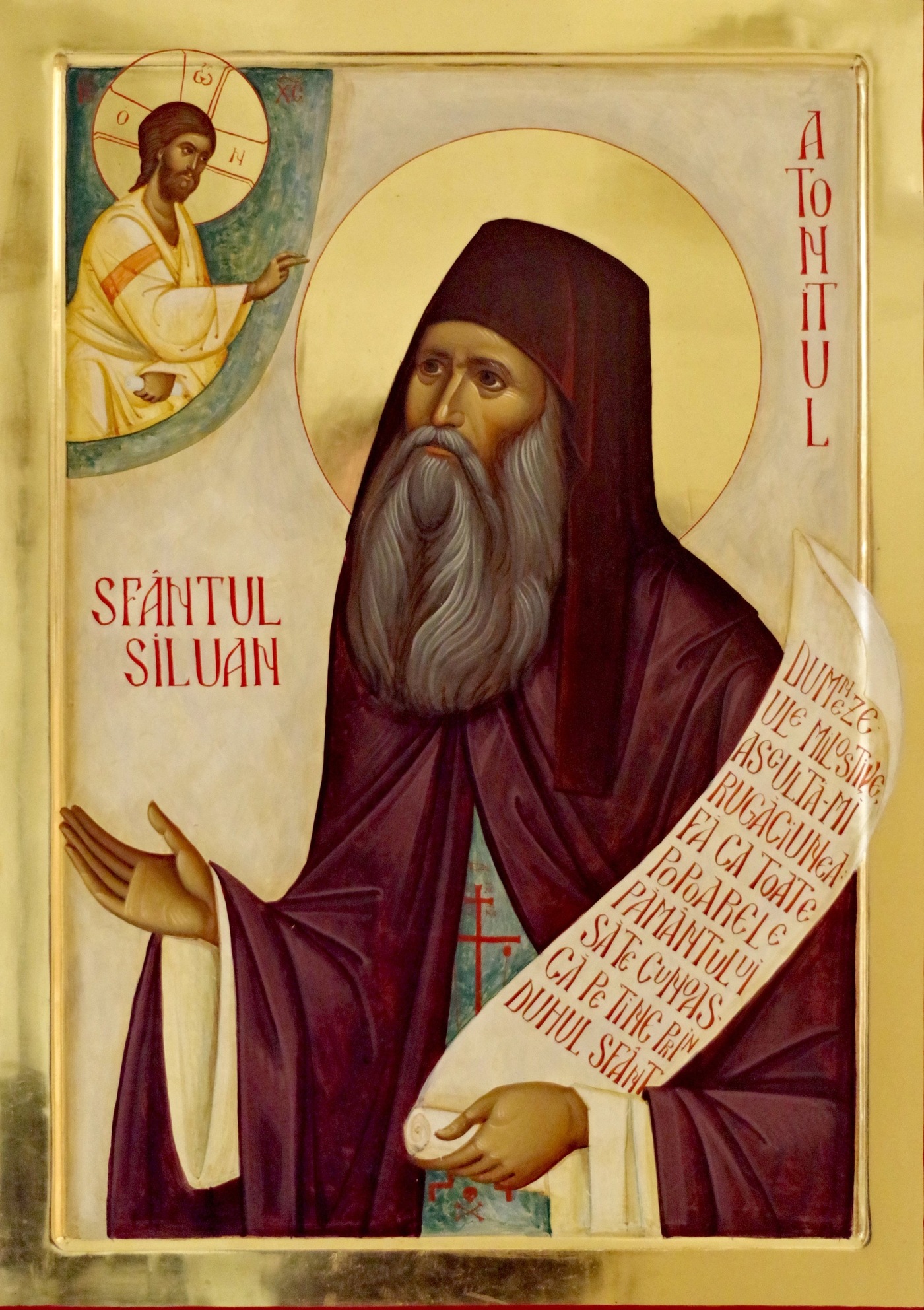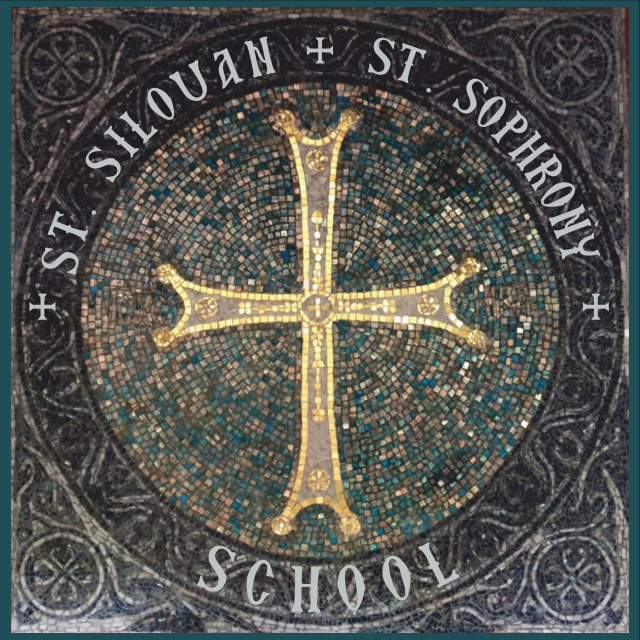Simeon Ivanovici Antonov was born in 1866 in a modest Russian peasant family. Simeon’s father was a man full of deep faith, kindness, and much wisdom, and was the first model for his inner life. Ever since he was a small child, at the age of four, Simeon said to himself, “When I grow up, I shall go all over the world looking for God”. Hearing then about the holy life and the miracles performed by St. John the Hermit (a Russian saint, contemporary with Saint Silouan, living in proximity to him at the time), young Simeon realized that “if saints exist, that means that God is with us and I do not need to journey the whole earth to find Him”.
At the age of nineteen, Simeon, engulfed by the love of God, feels an interior transformation and an attraction to the monastic life. His father is very strict, sending him to first fulfill his military service. This exceptional state lasted three months, and then left him. Young Simeon, vigorous and handsome, began to live a life similar to that of young people of his age: a life very far from the holiness of the divine inspiration that visited him. Having a very robust nature and exceptional physical strength, he experienced many temptations of youth: one day he hit a fellow from his village so powerfully that he was barely left alive.
In the turmoil of that life full of sin, his first calling to the monastic life began to fade. One day he was awoken from a nightmare by the gentle voice the Mother of God, and it shook his troubled soul. Until the end of his life, Saint Silouan thanked the Blessed Virgin because she well pleased to save him from his fall. This second calling, that happened shortly before his military service, played a decisive role in the choice of the path on which he would henceforth walk. Simeon felt deep shame for his past and began to fervently repent before God. His attitude toward all he saw in this life changed radically.
He carried out his military service in Saint Petersburg, being held in high esteem by his comrades, but his thought was always towards repentance, toward the Holy Mountain where he sometimes even sent money. During his military service, his advice saved from dissolution the family of a young soldier who had succumbed to temptation. Shortly before his release, he went to ask for the blessing of father John of Kronstadt, but not finding him, he left a letter.
Returned home, with the strength of the prayers of the holy father John, he embarked on a new period of his life: Mount Athos, the “Garden of the Mother of God”. At the age of twenty-six he entered into the community of the Russian monastery of the Holy Martyr Panteleimon, named Russikon.
Immersed in the Athonite tradition – prayer in solace at one’s cell, the lengthy church services, fasting, vigils, confession and communion, reading, work, and obediences, brother Simeon partook of the untold joy of the Jesus prayer, “Lord Jesus Christ, Son of God, have mercy upon me, a sinner!”
One night, while he was praying before the icon of the Mother of God, he received – as a priceless gift – the unceasing prayer of the heart, that erupted from within, without cessation. Lacking in experience, the young brother then fell into terrible temptation: demonic torment. After six months of internal torture, one afternoon, sitting in his cell, he reached the last stage of despair, experiencing for an hour the complete abandonment by God, abandonment that immersed his soul in the darkness of a hellish terror.
Falling prey to this terror and sadness, he went to the Church of St. Elijah. Barely did he whisper “Lord Jesus Christ, have mercy upon me!” and before the gates of the altar, where the Icon of Redeemer stands, he saw the Living Christ! His entire being was filled with the fire of the Holy Spirit, a Heavenly light engulfed him, and his mind was caught up to the heavens. The intensity of the vision provoked a state of utter exhaustion to the brink of death. Saint Silouan is part of those rare saints that received ever since the beginning of the ascetic path the perfection of God’s grace. Their path is the most difficult, because the feeling of abandonment and of losing the grace ravages the soul (“you cannot understand my pain”, used to say Saint Silouan).
A few days after the vision of Christ, Simeon lived a state of paschal joy. Then a while passed. On a feast day, the same grace visited him for a second time, but with less intensity and then gradually the presence of the grace began to dissipate; the peace and joy were replaced by a terrible restlessness and fear of losing the grace. Then, a very long period followed: fifteen years of continuous alternations between visitations of grace and abandonment, along with intense demonic assaults.
Fifteen years after the first vision of Christ, during a terrible night of spiritual struggle against the demons, Silouan fell again in the clutches of a despair akin to death and faithlessness. Distraught, with a heavy heart, he prayed fervently. And then he heard the voice of the Lord: “The proud always suffer from devils”. “Lord”, said Silouan, “teach me what I must do that my soul may become humble”. Once more, his heart heard God’s answer, “Keep thy mind in hell, and despair not”. From then on, his soul understood that the battle against evil is fought in our hearts and the ultimate root of evil is pride. Silouan then started to concentrate all the power of his soul to receive the humility of Christ: he vanquished all earthly suffering, throwing himself in an even greater suffering, casting himself to hell, as being unworthy of God; but, convinced of the Love of God, he wisely stood on the edge of the abyss and did not fall into despair.
After another fifteen years, Silouan followed the arduous path that was shown to him. From then on, the grace never left him. In this state, Saint Silouan began to understand, in their profoundness, the great mysteries of spiritual life. Little by little, in his prayer, pushed to the extreme and accompanied by plentiful tears, predominated compassion for those that did not know God. The Holy Spirit allowed him to live fully the love for “the whole of Adam” – the Love of Christ for all humanity.
The same love guided Silouan to leave in writing his inner experience, his extraordinary spiritual life, almost completely ignored by his fellow monks. In that period of his life, he is discovered by Archimandrite Sophrony, his disciple, who would make his writings known to the world.
The earthly end of Saint Silouan the Athonite was just as gentle, quiet, and humble as his entire life as a monk. After a short suffering of eight days, completely lucid, serene and immersed in prayer, he passed away between 1 and 2 AM on the night of 24 September 1938, while the matins service was taking place in the church of the infirmary.

